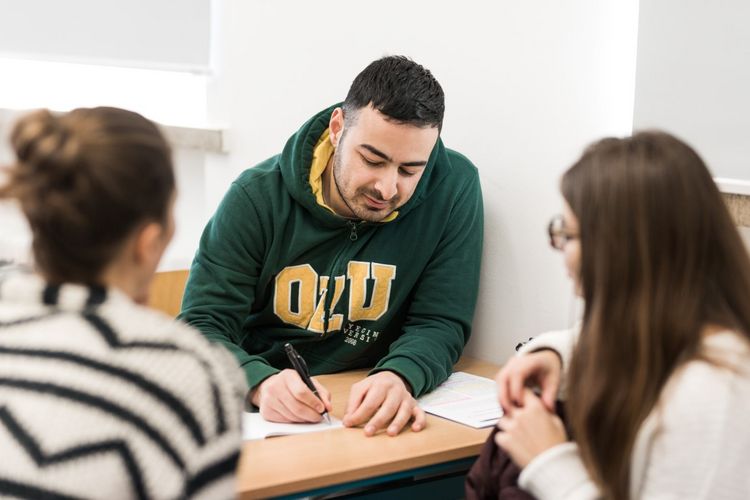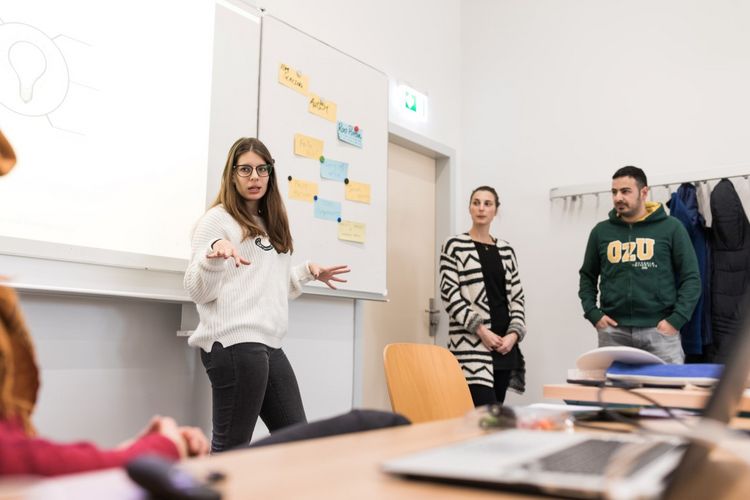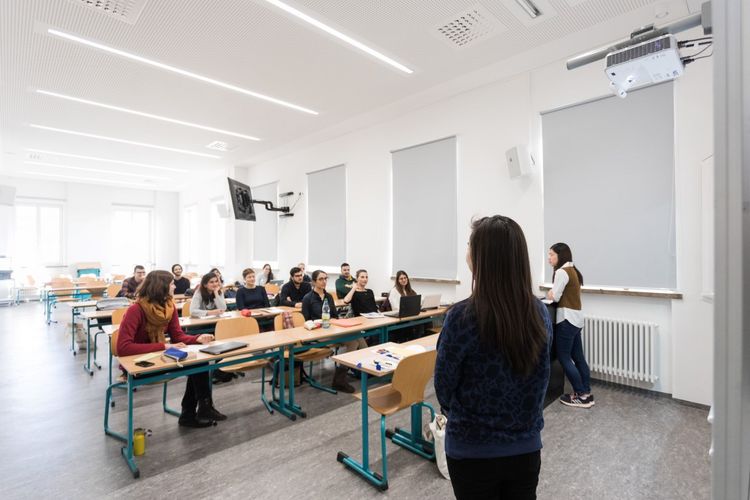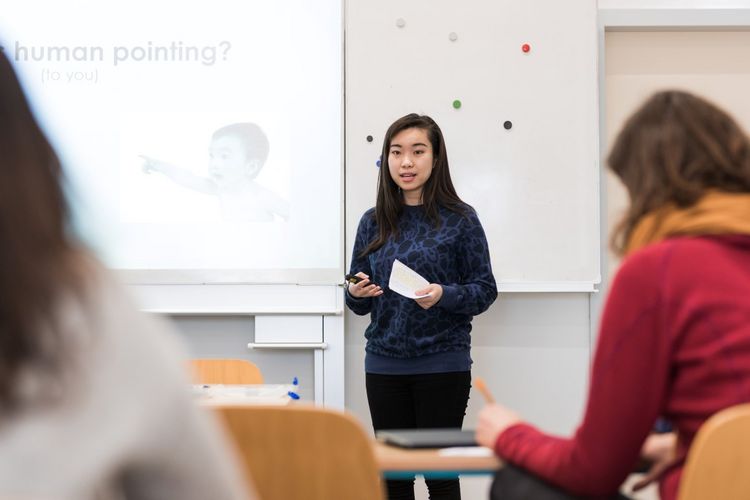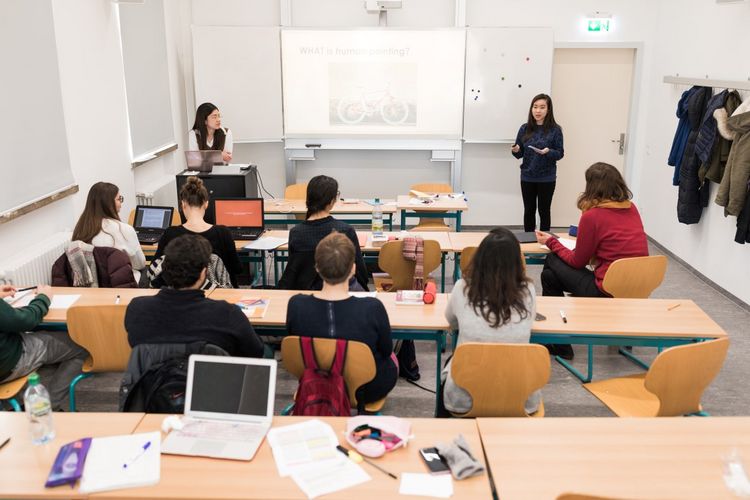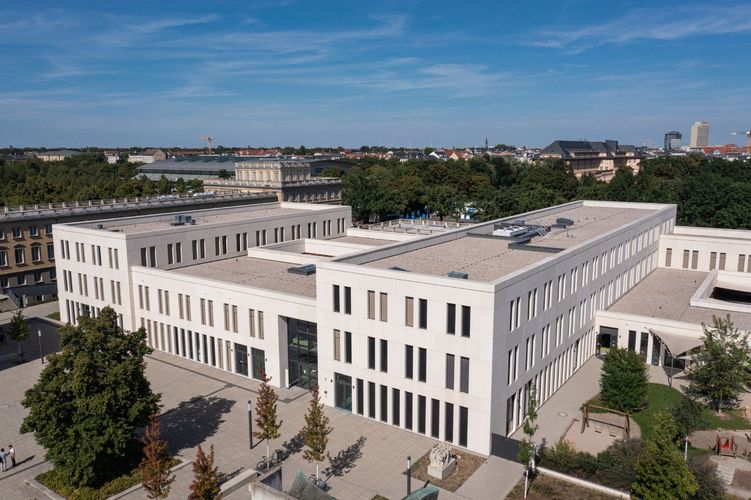Der Masterstudiengang Child Development and Intervention widmet sich der positiven und gesunden kindlichen Entwicklung und deren gezielter Förderung. Der Studiengang zeichnet sich durch kleine Kohorten aus, die einen intensiven Austausch zwischen Dozierenden und Studierenden ermöglichen, sowie praktische Forschungs- und Praktikumsmöglichkeiten. Der Lehrplan des Masterstudiengangs Child Development and Intervention schult die Studierenden insbesondere darin, modernste wissenschaftliche Erkenntnisse in wirksame praktische Unterstützungsansätze für Kinder und Familien umzusetzen.
4. Mai 2024: Studieninformationstag
Wir laden Sie herzlich zu unserem Studieninformationstag ein! Schnuppern Sie einen Tag lang Campusluft, lauschen Sie spannenden Vorträgen zu unseren Studiengängen und lassen Sie sich rund um das Thema Studium beraten. Das Programm und alle Infos finden Sie auf unserer Webseite oder direkt in der Veranstaltungsapp.
Der Masterstudiengang Child Development and Intervention (CDI) ist Nachfolger des Early Childhood Research Masters (ECR). Mehr Informationen zum ECR finden Sie hier.
Auf einen Blick
-
Studienrichtung
Lehramt und Erziehungswissenschaften, Psychologie -
Studientyp
weiterführend -
Abschluss
Master of Science -
Lehrsprache
Englisch -
Studienform
Vollzeit, Teilzeit -
Studienbeginn
Wintersemester -
Zulassungsbeschränkung
örtlich zulassungsbeschränkt -
Regelstudienzeit
4 Semester
-
Leistungspunkte
120
Zugangsvoraussetzungen
- ein erster berufsqualifizierender Hochschulabschluss
- Englischkenntnisse auf Niveau C1 des Gemeinsamen Europäischen Referenzrahmens
- Grundkenntnisse in Forschungsmethoden und Statistik
Das Vorliegen der genannten Voraussetzungen wird durch die Fakultät überprüft, die hierüber einen Bescheid erlässt. Dieser dient zum Nachweis der entsprechenden Zugangsvoraussetzungen.
Inhalte
Der Masterstudiengang Child Development and Intervention gliedert sich in drei Kernmodule: Forschung, Forschung - Praxis und Transfer.
Forschung: Die Studierenden erhalten eine fundierte Grundlagenausbildung in klinischer Entwicklungstheorie und analytischen Methoden für die Durchführung von Kindheits- und Interventionsstudien in diversen Kontexten. Dies bereitet sie ideal auf eine Promotion im Bereich der kindlichen Entwicklung und seelischen Gesundheit vor, sowie die Mitarbeit und Gestaltung von Forschung zur positiven und gesunden kindlichen Entwicklung an akademischen, gemeinnützigen, staatlichen oder industriellen Einrichtungen.
Forschung - Praxis: Mit stärkenorientierten, wissenschaftsbasierten Diagnose-, Interventions- und Präventionsansätzen zur Stärkung der sozial-emotionalen Entwicklung und Gesundheit von Kindern in verschiedenen Sozialisationskontexten wird in diesem Modul Wissen in Praxis umgesetzt. Die Absolvent:innen werden damit ausgezeichnet auf eine beratende Tätigkeit (einschließlich der Konzeption, Durchführung und Bewertung von Interventionsansätzen und -strategien) in diversen Einrichtungen, wie z. B. Schulen oder in ambulanten Versorgungszentren, vorbereitet.
Transfer: Die Studierenden lernen, Forschung über die Grenzen der akademischen Welt hinaus zu kommunizieren, um deren Wirkung zu verdeutlichen. In diesem Modul wird erlernt, wie Forschungsergebnisse in leicht verständliche Materialien und Richtlinien verwandelt werden können, die für Kinder selbst, Eltern, erzieherisch und klinisch tätige Personen, sowie politische Entscheidungsträger:innen in nationalen und internationalen Kontexten zugänglich gemacht werden. Es befähigt die Absolvent:innen dazu, verantwortungsvolle Aufgaben im Bereich der Wissenschaftskommunikation in sozialen und politischen Institutionen auf lokaler, nationaler und internationaler Ebene wahrzunehmen.
Der zweijährige Studiengang wird vollständig auf Englisch angeboten und bietet ein einzigartiges Curriculum. Das Themenspektrum umfasst:
- empirische Methoden und Statistik
- wissenschaftliches Arbeiten
- Kindheitsforschung im interdisziplinären Kontext
- sozial-emotionale Entwicklung von Kindern
- psychopathologische Entwicklungsverläufe
- stärkenorientierte Diagnostik
- Interventions- und Präventionsmethoden zur Förderung der Entwicklung und des Wohlbefindens von Kindern
- Transfer von Forschungsergebnissen in Gesellschaft und Politik
- Wissenschaftskommunikation und Öffentlichkeitsarbeit
Das Studium umfasst 120 Leistungspunkte, davon entfallen 25 Leistungspunkte auf die Masterarbeit und 5 Leistungspunkte auf ein angewandtes Forschungspflichtpraktikum von 4 Wochen.
Um dem interdisziplinären Charakter der Kindheitsforschung gerecht zu werden, gliedert sich das Studium in Forschungs-, Forschungs-Praxis-, und Transfermodule, die von Dozent:innen aus der Erziehungswissenschaft, der Psychologie und der Philosophie angeboten werden.
- englischsprachiger Studiengang
- internationale Studierendenschaft
- kleine Kohortengruppen
- intensiver Austausch zwischen Lehrpersonal und Studierenden
- interdisziplinäre Ausrichtung
- Studium beinhaltet angewandtes Forschungspflichtpraktikum
- einzigartiges Curriculum mit dem Fokus, Forschungserkenntnisse in Praxis und Politik zu übersetzen
Das Masterprogramm Child Development and Intervention bereitet seine Studierenden für eine Tätigkeit in den Bereichen Forschung, Forschung-Praxis und Transfer vor.
Forschung: Der CDI-Masterabschluss qualifiziert seine Absolvent:innen für eine Promotion im Bereich der kindlichen Entwicklung. Darüber hinaus können CDI-Absolvent:innen auch direkt in empirischen und angewandten Forschungsprojekten in akademischen, gemeinnützigen, staatlichen oder industriellen Einrichtungen mitarbeiten.
Forschung - Praxis: Absolvent:innen des CDI können die positive Entwicklung und seelische Gesundheit von Kindern auch in der Praxis unterstützen. So können sie z.B. Interventionen in Schulen, Kindergärten oder ambulanten Versorgungszentren entwickeln, durchführen und evaluieren.
Transfer: Absolvent:innen des CDI können in sozialen und politischen Institutionen auf lokaler, nationaler und internationaler Ebene im Bereich der Wissenschaftskommunikation tätig werden. Hier können sie z.B. wissenschaftliche Erkenntnisse über die positive Entwicklung von Kindern in niedrigschwellige Informationsmaterialien verwandeln, die für die breite Öffentlichkeit zugänglich sind.
Das Masterstudium beinhaltet ein Pflichtpraktikum. Einzelheiten darüber regelt die Praktikumsordnung im Rahmen des Masterstudiengangs.
Ein Auslandsaufenthalt wird grundsätzlich empfohlen. Er ist von den Studierenden selbst zu organisieren.
Bewerbung
Studienbeginn: Wintersemester
Zulassungsbeschränkt (NCU): ja
Bewerbungsfrist: 02.05. – 31.05.
Bewerbungsportal: AlmaWeb
Beachten Sie unbedingt unsere weiteren Informationen auf den Seiten „Online-Bewerbung” und „Bewerbung für ein Masterstudium”.
Internationale Studierende finden Informationen zu den Bewerbungsfristen und zum Bewerbungsverfahren auf der Seite „International”.
Eine Immatrikulation in höhere Fachsemester dieses Studiengangs ist momentan nicht möglich.
Internationalität
Pflichtcurriculum in englischer Sprache
